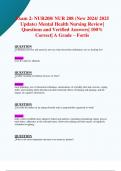Exam 2: NUR208/ NUR 208 (New 2024/ 2025
Update) Mental Health Nursing Review|
Questions and Verified Answers| 100%
Correct| A Grade – Fortis
QUESTION
In Bulimia nervosa and anorexia nervosa what electrolyte imbalances are we looking for?
Answer:
Low K+ and low albumin
QUESTION
healthy teaching in bulimia focuses on what?
Answer:
meal planning, use of relaxation techniques, maintenance of a healthy diet and exercise, coping
skills, and teaching about the physical and emotional effects of binging and purging, and the
impact of cognitive distortions.
QUESTION
Describe the milieu of an eating-disorder unit is purposefully organized to what?
Answer:
help a client establish more adaptive behavioral patterns, including normalizing eating. precise
meal times, adherence to the selected menu, observation during and after meals, ad regularly
scheduled weighing.
QUESTION
What is the most important outcome in an anorexic patient?
,Answer:
A safe weight
QUESTION
What are underweight or malnourished clients at risk for?
Answer:
electrolyte imbalances and death
QUESTION
Fine downy hair on face and back of anorexic patient is called what?
Answer:
Lanugo
QUESTION
Findings consistent with anorexia?
Answer:
cool mottled skin, low blood pressure, pulse, and temperature are findings consistent with a
malnourished, dehydrated state noted in clients with anorexia nervosa.
QUESTION
if diagnosed with anorexia nervosa clients need what?
Answer:
a highly structured environment that includes precise meal times, adherence to the selected
menu, observation during and after meals, and regularly scheduled weighing.
, QUESTION
What is a way that a the nurse can give the client some freedom?
Answer:
make limited food choices as weight gain progresses.
QUESTION
Thoughts and behaviors associated with anorexia nervosa
Answer:
terror of gaining weight, preoccupation with thoughts of food, view of the self as fat even when
emaciated, peculiar handling of food. (cutting food into small bits, pushing pieces of food around
the plate, possible development of rigorous exercise regimen, possible self-induced vomiting, use
of laxatives or diuretics, and cognition so disturbed that the individual judges their self-worth by
their weight.
QUESTION
Rumination Disorder:
Answer:
undigested food being returned to the mouth - rechewed and reswallowed - neglect, intellectual
disability, infants/ children
QUESTION
Rumination Disorder
Answer:
the regurgitation of recently eaten food into the mouth followed by either rechewing,
reswallowing, or spitting it out
QUESTION
What are some predisposing factors for the development of rumination disorder?




